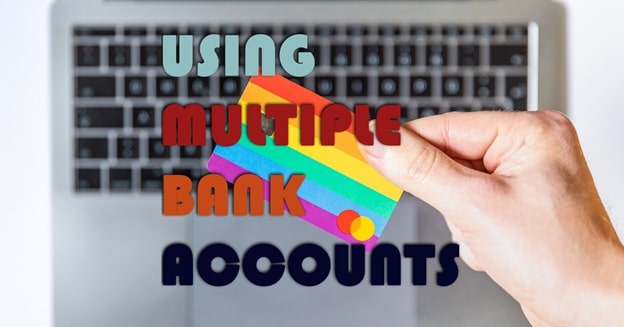“Out of sight, out of mind.” That’s at least partially the theory behind keeping your checking and savings accounts with separate banks.
According to CNBC, this money move adds “friction” between you and your cash savings. In other words, it creates a barrier so that you’re less tempted to spend what’s in your checking account.
The result is painless saving.
But you don’t have to stop there. Let’s discuss.
The Benefit of Multiple Bank Accounts
The upside of having multiple bank accounts is obvious: you’ll likely save a lot more.
That’s because you’ll be able to divert some amount of your paycheck to a savings account that’s more difficult to access. It won’t be in the same place as your “spending” money. And, because of that, you’ll be less likely to spent it.
You’re creating friction between yourself and your money.
Adding “Friction” to Your Finances

In physics, friction means resistance.
When you add a layer of resistance between you and your finances, the result is less spending.
You can’t mindlessly spend money when you have to take extra steps to move it over from one account to another.
Even a simple barrier like that can be enough to stop you from spending money on something you don’t need.
But how about taking this a step further?
Why not invest that money instead of just allowing it to pile up in a savings account?
Investing Your Cash
Sure, letting your money pile up in a savings account isn’t a bad thing. But is it the best thing you could be doing with that money?
What if you invested that money into, say, a stock or index fund? Or even a piece of real estate?
Assuming you buy high quality assets, you can start making a return on that money. If all goes well, that money will grow over time and you can reap greater rewards.
And while your money is invested, you’re even less likely to spend it.
Investing Friction: Liquidity, Tax Consequences, and Margin Debt
Say, for example, you invest your money in a stock portfolio. You’ll likely trigger a taxable event by selling your stocks if you want to spend that money.
That’s friction that will discourage you from spending.
Alternatively, you can take out debt to access that money. But this still creates a layer of friction – now the decision is whether you want to pay interest and risk a margin call on that debt.
And this is before we even talk about the opportunity cost of taking money out of your stock portfolio. You’ll need to weigh the cost of losing out on future gains before you pull money out.
You’ll think twice before liquidating your stocks (or leveraging them) to spend it on something you don’t actually need.

Cash Savings Have Less Friction
The more hoops to jump through, the marrier, at least when it comes to not spending your money frivolously.
The opportunity cost of spending cash in the bank is less obvious.
You can more easily rationalize that it’s just sitting there losing value to inflation, and you wouldn’t be wrong to do so. Therefore, spending it now while its value is greater than what it will be tomorrow doesn’t seem like such a bad idea.
The barrier is smaller, so the temptation to spend it is larger.
However, investing your cash isn’t without drawbacks.
The Downside of Investing
When you’re invested in the market, your money is less liquid. Again, this means that it’s not as easily available to you and that’s a good thing for curbing spending.
But this is a double-edged sword.
If your money is locked up in an investment, but an expensive emergency pops up and you don’t have enough cash on hand, you’ll have to liquidate your investments.
Not only might this trigger a taxable event, but it might also force you to sell during a market downturn that you were planning on holding through.
That’s why it’s important to be prepared before you start investing. Having some liquid cash set aside for emergencies is a good idea, especially if you have debt.
You don’t want to get over-leveraged!
So tread carefully.
Automating Your Finances
Thankfully, if you’re set on creating friction between you and your funds, then you automate a lot of the process.
By this, I mean automatically setting aside a percentage of your salary to ensure you never waver from your savings goals. Or maybe setting up automatic monthly or weekly orders in your investment accounts.
Just about any financial institution can arrange for some sort of automatic deposit to be diverted directly to a separate account or fund each month, so take advantage of that!
Doing so removes you from the equation, at least partially. You’ll subsequently limit the temptation to save less and spend more.
Then you can start moving more aggressively towards your financial goals.
Should You Use Multiple Bank Accounts?
Whether or not you choose to open multiple bank accounts or simply invest your excess cash is your call. In either case, the goal is the same: create friction between you and your money.
Automation is key in that effort!
The result will be greater savings, pushing you closer to realizing financial success.
This website, and any communication stemming from it, while hopefully informative, should not be taken as financial or legal advice. Assume all links are affiliate links. I am an Amazon affiliate.


